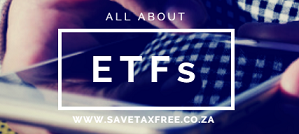How do I pick the right ETF or ETN to invest in?
Related Articles
Ridwaan Moolla | 01 July 2016
With Absa Stockbrokers offering clients the opportunity to invest in a tax-free savings account (TFSA) through exchange-traded funds at such beneficial rates (no monthly fee and brokerage as low as 0.2%), the only remaining question is: “Which is the right ETF for me?”
The answer is simple. Have you used up your tax-free allowance of R30 000? If not, a tax-free savings account is a good place to start. Click here to open a TFSA now.
You have a choice of 38 ETFs that offer exposure to local and offshore markets. You can, through your choice of ETF, invest in property, shares in the Top 50 or Top 100 biggest companies on the JSE, bonds, or cash earning interest. You even get exposure to companies like Apple or Alphabet (as you may know, Alphabet famously owns Google).
You may wonder how the offshore exposure works – after all, the TFSA is in rands and not dollars. Billionaire Warren Buffet offered part of the answer; asked what must be done with his billion-dollar investments after he is gone, Buffet replied:
“My advice to the trustee could not be more simple. Put 10% of the cash in short‐term government bonds and 90% in a very low‐cost S&P 500 index fund. I believe the trust’s long-term results from this policy will be superior to those attained by most investors — whether pension funds, institutions, individuals — who employ high fee managers.”
So, can a TFSA account adhere to this wisdom? Yes, it can. Here is how:
- “10% in bonds”: Invest in the New Funds ILBI ETF to achieve this goal.
- “90% in the S&P 500”: This may take a little more effort to achieve through a TFSA, but we can do something similar. For instance, we split the 90% equally between the NEW FUNDS S&P Top 50 and the DBX MSCI World Index ETF. This offers you both local exposure to the top 50 shares based on Buffet’s S&P methodology and exposure to the top companies worldwide, without affecting your offshore allowances. An additional benefit of the offshore exposure is that it hedges your rand investment against a weakening currency. A depreciating rand means your investment will profit even if the shares in the tracker do not move up in value.
For more information on these ETFs visit absastockbrokers.co.za and view the product information for ETFs.
Buffet raises the matter of costs; more precisely, that they should be “very low”. At the time of writing, the DBX was the only option available for offshore exposure. For the rest, we have chosen the cheapest ETFs. To get an idea of the cost, you should look at the total expense ratio (TER).
We have matched Buffet’s ideal portfolio quite closely. Alternatively, you could invest in the World Trader Account from Absa Stockbrokers and actually buy the S&P 500. That, however, is a story for another day.
Another issue to consider is that Buffet’s split may not be right for you. You might prefer a much broader split, for instance by investing in the MAPPS ETF, or you might prefer to stick to certain sectors you feel strongly about.
What else is there on the investment and trading horizon?
If you have used up your R30 000 in the TFSA but are not quite ready to start investing in individual shares, simply stick to ETFs. Shares are not a must-have. ETFs have become a lot smarter these days, and ETFs — and exchange-traded notes (ETNs_ can do a lot for you.
Let’s expand the ETFs from your TFSA account by taking on a bit more risk and start going into sectors. You can pick the property ETFs of Coreshares (CoreShares PropTrax SAPY or CoreShares PropTrax Ten) or ETFs from the industrial or financial sectors. For exposure to commodities, you can invest with Newgold, New Platinum, or New Palladium. Pick the sectors that you feel strongly about and invest to achieve your goals. An additional benefit is that you will now really have a diversified and better-balanced portfolio.
If you finally make millions and are headed to the States for that coveted holiday, the exchange rate becomes an issue. It may not be the right time for you to exchange rand, or you may have concerns about which way the exchange rate is trending. An ETN called the ETN-NewWave US Dollar may solve your problem. One ETN here equals $1 in the US at the current wholesale rate, without any impact on your offshore allowance. Forex traders even use ETNs to trade in currencies without exposure to the notoriously risky margins.
If you were wrong in your exchange rate expectations and it moves against you, the local profits will cover the difference you will have to pay when converting your rands to US dollars. (This is also available for the euro and British pound; for more information please visit www.absastockbrokers.co.za)
We hope that we have convinced you that ETFs and ETNs can do all the investing and even trading that you need . There is no need to worry about in-depth, individual company analysis. All you have to do is ensure that the ETF or ETN you invest and trade in matches your risk profile and investment strategy. Also, watch out for the costs – the TER.
So, if you do not have a TFSA or ETF only account yet, go to absastockbrokers.co.za now and open them. You are not going to get better value anywhere else!!!






